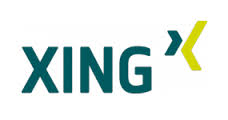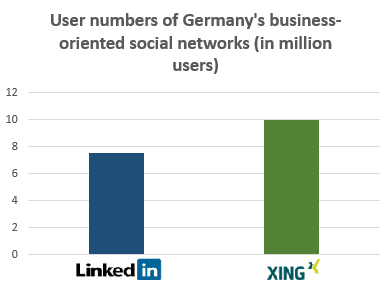XING is Germany's largest business-oriented social media site and has done well in the German-speaking countries. However, its fate is uncertain due to a giant American competitor – LinkedIn – which is driving towards global dominance. I have both a XING account and a LinkedIn account, but I confess I hardly ever look at XING, while I check LinkedIn every day. This makes sense for me, since I am in the US and most of my business activity is in the US. But I also have business acquaintances around the world – nearly all of them are on LinkedIn, and that is how we stay in touch with each other.
The management of XING would surely scoff at my concerns about the company. After all, XING achieved an EBITDA of €36 million on total revenues of €122 million in 2015 (see the XING 2015 annual report (pdf warning)) and is thus quite profitable and showing decent growth. And XING's market capitalization is more than €600 million.
But LinkedIn's revenue is more than $3 billion, and, despite the market pull-back earlier this year, its market capitalization is $17 billion. Thus it has the resources and scale to dominate any market it wishes to – including the German market. For the time being, XING still has more users in Germany than LinkedIn.
As for the competitive threat of LinkedIn in Germany, Leo Semmelmann, an economics student in Mainz, offers this cautionary tale of what happened when Facebook came to Germany:
Let me tell you a story. In 2006, there was only one really successful social network in Germany. It was called "StudiVZ" or "SchülerVZ." Everything went well for the unchallenged German market leader. The numbers of users were rapidly raising. Facebook (NASDAQ:FB) even offered 4% of its shares to take over StudiVZ. Stefan von Holtzbrinck, the owner of StudiVZ and SchülerVZ, rejected the offer self-confidently.
This was a mistake. In subsequent years, StudiVZ lost more and more users while its rival Facebook conquered the German market. Facebook offered the same features like StudiVZ – and even more. Users on StudiVZ were only able to connect to German users, whereas Facebook users could connect to the whole world. In 2013, Stefan von Holtzbrinck buried StudiVZ while Facebook exceeded the 25 million user mark in Germany.
It is unlikely that LinkedIn will see the need to acquire XING. But if it does, hopefully the Board of XING will not make the same mistake as Stefan von Holtzbrinck.



